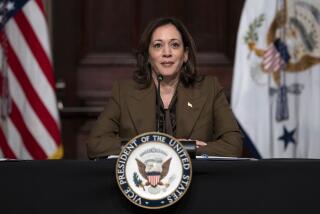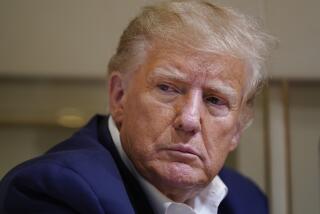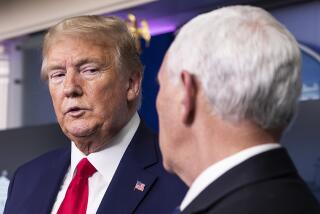Sources Quote Account of May Meeting : Regan Denied Arms Sale, Shultz Testifies
- Share via
WASHINGTON — Even as Administration officials were preparing for a dramatic mission to Iran last May, White House Chief of Staff Donald T. Regan assured Secretary of State George P. Shultz that rumors about U.S. arms sales to the Tehran regime were not true, Shultz told the House Foreign Affairs Committee, according to congressional sources who heard his testimony at the closed session.
One source on Saturday paraphrased Shultz as saying that Regan told him: “I don’t know what you’re talking about.”
The encounter was reported to have occurred at the May 4-6 economic summit meeting in Tokyo, four months after President Reagan authorized the arms deals and only days before U.S. officials--including former National Security Adviser Robert C. McFarlane and then-White House aide Lt. Col. Oliver L. North--undertook a secret mission to Iran in which they tried unsuccessfully to swap U.S. weapons for hostages.
Separately, a dispute was welling on Capitol Hill over a recommendation by the independent counsel investigating the controversy that Congress refrain from granting immunity to North and former National Security Adviser Vice Adm. John M. Poindexter. The two, who are considered central figures in the arms deals and the diversion of profits to the Nicaraguan rebels have refused to testify, citing Fifth Amendment protection against self-incrimination.
At that same summit where Shultz had received word of the arms deals, President Reagan and the leaders of six other nations had pledged to present a “unified front” against terrorism, and the President had tried to persuade the other heads of state to condemn Libya for sponsoring international terrorism.
The White House declined to comment on the reports of Shultz’s account.
The revelation deepens the mystery over the roles that were played by such key officials as Shultz and Regan in the Administration’s secret dealings with Iran. Shultz apparently did not indicate in his testimony before the committee Wednesday whether he believed Regan had misled him, and reportedly told the committee that Regan had expressed alarm at the news of the planned sales. Shultz was said to have been tipped to the arms deal by Charles H. Price II, U.S. ambassador to Britain.
However, there is at least circumstantial evidence that Regan was aware of the plans. A draft report by the Senate Intelligence Committee said it appeared that the chief of staff had “an understanding of the general outline and progress of the Iran program” from its initial stages.
Congressional Criticism
Shultz opposed the initiative and has sought to publicly distance himself from it, but congressional critics have faulted the secretary’s claims of lack of knowledge, saying he did not try hard enough to keep abreast of its progress.
While one congressional source described Shultz as “a guy whose gut instinct was right,” he said Saturday: “His concern about this seems very spasmodic. . . . He didn’t want to force this thing.”
Shultz himself acknowledged in public testimony last month before the Foreign Affairs Committee that once Reagan had made the decision to proceed with the sales, “if the President’s initiative had any chance of success, it would have to be a secret initiative. . . . I didn’t need to know things that were not in my sphere to do something about.”
In describing what he knew of the operation, Shultz had earlier told the committee: “What I heard was conflicting. At times that there was some sort of deal or signal in the works, and at other times that the operation was closed down, and in fact, the word used at one time with me was that the people involved had been told to stand down.”
Negotiations Continued
Also included in Shultz’s testimony last week was the disclosure that the State Department and the CIA had continued to negotiate with Iran as late as mid-December, a month after the arms sales became public and plunged the Administration into its worst crisis.
As special select committees in each house prepare to begin their own investigations of the arms deals and the diversion of profits to the contras , independent counsel Lawrence E. Walsh has written in a letter to key lawmakers saying that granting immunity could create “serious and perhaps insurmountable barriers” to the possible prosecution of North and Poindexter. Reagan has asked that immunity be granted as a means of quickly resolving the remaining questions about the deal.
House Foreign Affairs Committee Chairman Dante B. Fascell (D-Fla.) agreed with Walsh, saying that immunity would be “inappropriate at this time.” But a Republican source noted that Walsh’s investigation could continue well past the dates later this year when the committees are required to conclude their investigations.
“His rationale practically precludes the committees from what they need to do,” the source said. “We have to look at it with different eyes than he is.”
More to Read
Sign up for Essential California
The most important California stories and recommendations in your inbox every morning.
You may occasionally receive promotional content from the Los Angeles Times.













